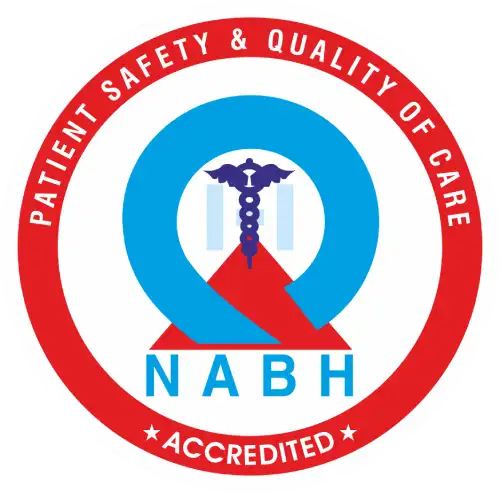Use of Laparoscopic Surgery in the Treatment of Digestive Disorders
Laparoscopic surgery, also known as minimally invasive surgery, has revolutionized the field of digestive disorder treatment in recent years. This technique involves making small incisions in the abdomen and using…
By Aadicura | 29 March 2023Laparoscopic surgery, also known as minimally invasive surgery, has revolutionized the field of digestive disorder treatment in recent years. This technique involves making small incisions in the abdomen and using specialized instruments and a camera to perform surgery. Aadicura Superspeciality Hospital is considered as one of the Best Laparoscopic Surgery Hospital in Vadodara. In this article, we will discuss the use of laparoscopic surgery in the treatment of various digestive disorders.
- Gallbladder Surgery: Laparoscopic cholecystectomy is a common surgical procedure that involves removing the gallbladder. This procedure is often performed to treat gallstones, which is nowadays a common condition affecting the digestive system. Laparoscopic cholecystectomy has become the gold standard for the treatment of gallbladder disease because it is associated with less pain, smaller incisions, and faster recovery times.
- Hernia Repair: A hernia occurs when an organ or tissue protrudes through a weakened area in the abdominal wall. Laparoscopic hernia repair is a minimally invasive surgical procedure that involves using a small camera and specialized instruments to repair the hernia. This procedure is associated with smaller cuts, less pain, faster recovery times, and fewer complications than open hernia repair.
- Reflux Surgery: Gastroesophageal reflux disease (GERD) is a common digestive disorder that occurs when stomach acid flows back into the esophagus, causing heartburn and other symptoms. Laparoscopic reflux surgery, also known as fundoplication, is a surgical procedure that involves wrapping the upper part of the stomach around the lower esophageal sphincter to prevent stomach acid from flowing back into the esophagus. This procedure is effective in treating GERD which doesn’t respond to other non surgical treatment options. This procedure is associated with less pain, faster recovery times, and also fewer complications than traditional open surgery.
- Colorectal Surgery: Laparoscopic surgery is also used to treat colorectal disorders such as colon cancer, diverticulitis, and inflammatory bowel disease. This procedure involves using a small camera and specialized instruments to remove a portion of the colon or rectum. Laparoscopic colorectal surgery is associated with smaller incisions, less pain, less blood loss, faster recovery times, and fewer complications than open surgery when performed by the Best Laparoscopic Surgeon in Vadodara at Aadicura Superspeciality Hospital.
- Bariatric Surgery: Laparoscopic bariatric surgery is a minimally invasive surgical procedure that is used to treat obesity. This procedure involves reducing the size of the stomach, which helps patients lose weight by limiting the amount of food they can eat. Laparoscopic bariatric surgery is associated with less pain, faster recovery times, reduced scarring, and fewer complications than traditional open surgery.
In addition to these procedures, laparoscopic surgery is also used to treat other digestive disorders such as pancreatic cancer, liver cancer, and spleen disorders. The benefits of laparoscopic surgery over traditional open surgery are clear. Our expert team of the most experienced and the Best Gastro Surgeons in Vadodara is dedicated to deliver the highest quality treatment and support for a range of digestive disorders and conditions.
FAQ’S
What is laparoscopy of the digestive system?
Laparoscopy of the digestive system, also known as laparoscopic surgery or minimally invasive surgery, is a type of surgical procedure that involves the use of a small camera and specialized instruments to perform surgery on the digestive system through small incisions in the abdomen. The camera provides a high-definition view of the surgical site, which is projected onto a monitor, allowing the surgeon to perform the procedure with precision and accuracy.Aadicura Superspecialist Hospital has The Best Laparoscopic Surgeons in Vadodara, who have expertise in the surgical field.
Laparoscopy of the digestive system can be used to diagnose and treat a wide range of digestive disorders, including gallbladder disease, hernias, reflux disease, colorectal disorders, and obesity.
What is the benefit of laparoscopic surgery?
Laparoscopic surgery, also known as minimally invasive surgery, offers several benefits over traditional open surgery. Some of the main benefits include:
- Less Pain: Laparoscopic surgery is associated with less pain than open surgery, as it involves smaller incisions and less tissue trauma.
- Faster Recovery: Laparoscopic surgery typically involves a shorter hospital stay and a faster recovery time than open surgery.
- Reduced Scarring: The small incisions used in laparoscopic surgery result in smaller scars than those from open surgery, which can be especially important for cosmetic reasons.
- Reduced Risk of Infection: The risk of infection is lower with laparoscopic surgery, as the smaller incisions mean that there is less exposure of the internal organs to the external environment.
- Improved Accuracy: The use of a camera and specialized instruments in laparoscopic surgery allows for better visualization of the surgical site and greater precision during the procedure.
- Reduced Blood Loss: Laparoscopic surgery typically results in less blood loss than open surgery, which can reduce the need for blood transfusions and other interventions.
What are the various surgeries for digestive problems?
There are several types of surgical procedures that may be used to treat digestive problems, depending on the specific condition and its severity. Some common examples include:
✔ Gallbladder Surgery: Gallbladder surgery, also known as cholecystectomy, is a procedure used to remove the gallbladder in cases of gallstones or other problems with the gallbladder.
✔ Hernia Repair: Hernia repair surgery is used to treat a hernia, which occurs when an organ or tissue protrudes through a weak spot in the surrounding muscle or connective tissue.
✔ Bariatric Surgery: Bariatric surgery, also known as weight loss surgery, is used to help people who are severely overweight or obese to lose weight and improve their overall health.
✔ Bowel Resection: Bowel resection is a procedure used to remove a portion of the large or small intestine in cases of cancer, inflammatory bowel disease, or other conditions.
✔ Esophageal Surgery: Esophageal surgery may be used to treat conditions such as gastroesophageal reflux disease (GERD) or oesophageal cancer.
✔ Pancreatic Surgery: Pancreatic surgery may be used to treat conditions such as pancreatic cancer or chronic pancreatitis.
Who needs laparoscopic surgery?
A good candidate for laparoscopic surgery is typically a patient who has a medical condition that can be effectively treated with this type of minimally invasive surgery. An expert gastro surgeon is someone who will be able to diagnose whether someone needs or is a good candidate for laparoscopic surgery. Some factors that may make a patient a good candidate for laparoscopic surgery include:
1. The nature of the medical condition: Laparoscopic surgery is often a good option for conditions that involve the abdomen, such as gallbladder disease, hernias, and colorectal disorders. The specific medical condition and its severity will determine whether laparoscopic surgery is a good option.
2. The patient’s general health: Patients who are generally healthy and do not have significant underlying medical conditions are often good candidates for laparoscopic surgery. However, patients with certain medical conditions, such as heart disease or lung disease, may not be good candidates for this type of surgery.
3. The patient’s age: Laparoscopic surgery can be performed on patients of all ages, from infants to elderly adults. However, older patients may be more likely to have underlying health issues that could make them a poor candidate for surgery.
4. The size and location of the organs or tissues being operated on: Laparoscopic surgery is often best suited for organs or tissues that are relatively small and accessible. If the organs or tissues are too large or located in a difficult-to-reach area, open surgery may be a better option.
5. The patient’s preferences: Some patients may prefer laparoscopic surgery over open surgery because of the smaller incisions, reduced pain, and faster recovery time associated with this type of surgery. Patient preferences and comfort level should be taken into account when determining the best course of treatment.
6. Overall, the decision to perform laparoscopic surgery should be made on a case-by-case basis in consultation with a qualified medical professional, taking into account the patient’s individual needs and medical history.
We at Aadicura Superspeciality Hospital being one of the Best Gastro Hospital in Vadodara strive to provide comprehensive and compassionate care for all our patients. We’re committed to providing exceptional care and support to every patient who walks through our doors. Contact us today to schedule an appointment and take the first step towards better digestive health.








